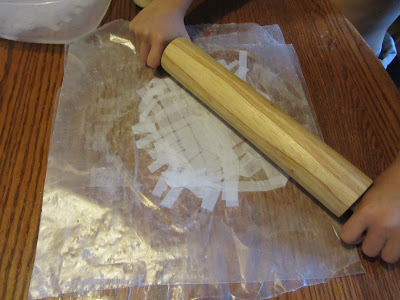We had another exciting week of "ancient studies" with our Egypt Unit. After a brief look at hieroglyphics and scribes (We will visit these more in depth in the coming weeks.), we took a pause to watch a quick video on how to make papyrus.
This, naturally, got my crafty fingers itchin'. I made a spur of the moment plan to try to make some of our own. Obviously, we don't have papyrus reeds growing in our backyard, so our version of this ancient paper making process had to be tweaked quite a bit. Although, our "papyrus" was not necessarily 100% authentic, the kids got a glimpse of the arduous process...and certainly a new found love of modern conveniences.
To Make "Papyrus", you will need:
- a sheet of white or linen colored paper
- 2 cups of water
- 1 cup of sugar
- 2 large sheets of wax paper or aluminum foil
- a rolling pin, large bowl, scissors
First, cut the sheet of paper into twenty-four strips 1/2 inch wide.
Lay 12 strips next two each other as close to each other as possible. Secure the top of the strips to the work surface with a piece of tape (optional).
Weave the remaining 12 pieces through the original 12.
Real papyrus does not have this "weaving". But instead, just has horizontal strips placed on top of vertical ones. However, since we were working with paper, I though it might be better to weave them.
Real papyrus is held together by the sugar of the papyrus reeds. When pressed, the sugar acts as a glue. To mimic this, mix together the 1 cup sugar and 2 cups water until the sugar has completely dissolved.
Cut the tape off of the weaving to release it from the work surface.
Place the weaving into the water/sugar mix. Leave for several hours so that the paper can absorb a significant amount of the sugar water. Remove weaving and transfer to wax paper. (It is easier to remove the weaving from the water if most...not all...the water is drained out of the bowl first.)
Sandwich the weaving between two sheets of wax paper. Press out the excess water and flatten the weaving together with a rolling pin (Or large, smooth stone...if you really want to be authentic).
Allow the weaving to dry over night.
Remove from the wax paper and cut off excess strips from the sides.
And there you have it. A modern day version of papyrus. Now to learn hieroglyphics...
More Ancient Egypt Ideas to Explore
*This post contains affiliate links.














Oh that is so cool! I need to remember this next year.
ReplyDeleteThank You so much for this free resource!
ReplyDelete